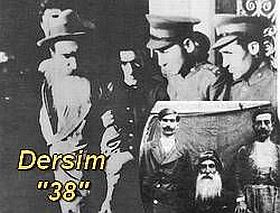


Cayan Demirel: 38

The old man asks for the camera to be turned off. He has a lot to say but he is worried. No broadcasting, he almost shouts loudly… no broadcasting, the voice behind the camera assures him, but turn it off, the old man repeats. Faces of old women, who say nothing, pass by, also in the beginning of this film which is banned in Turkey, will never be shown on the state controlled television but circulates through other channels. The topic of the film, says one of the interviewed historians, ”can be characterized as a genocide. But neither the Kurds living in Dersim, the Alevi Kurds, nor the written press, nor even the universities in Turkey, are conscious of the issue”. In 2008 this tabooed topic was raised at a conference in the European Parliament together with the Armenian genocide performed by Turkey.
The Turkification, by Atatürk and his government called the civilisation programme, of the Dersim (today renamed Turceli) province took place through force, deportations and massacres of rebels under the leadership of Seyit Riza. His story (and heroic death) is part of what is being told in this elegy that is built up around interviews with historians and sociologists combined with a few survivors, who are able to tell what they experienced themselves or convey what was told them by relatives. The film is extremely wordy with documents being shown on the screen, at the same time as the director through music and editing appeal to the audience’s emotions. As pretty ignorant in Turkish modern history, and as you have to read subtitles all the time, you do sense the information bombardment as too much, at the same time as you can only admire the courage of the film team and hope they reach a substantial national audience.
Turkey, 2006, 67 mins.